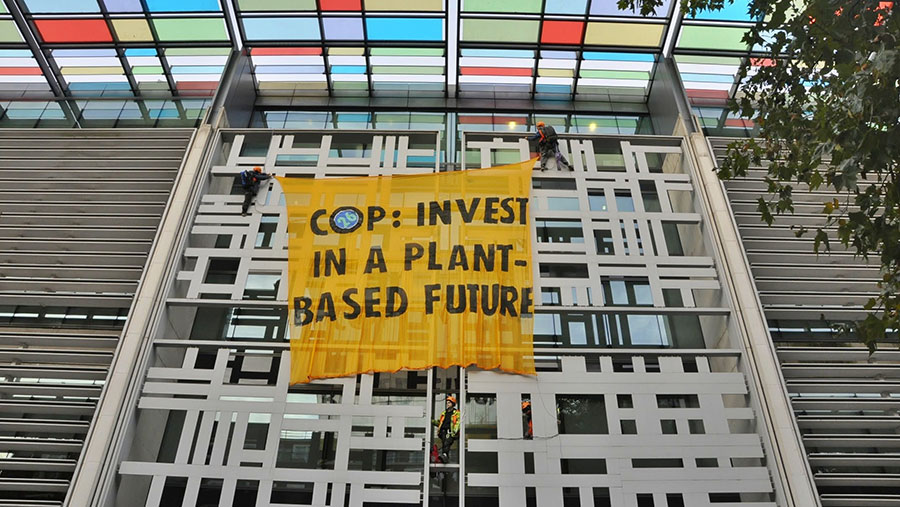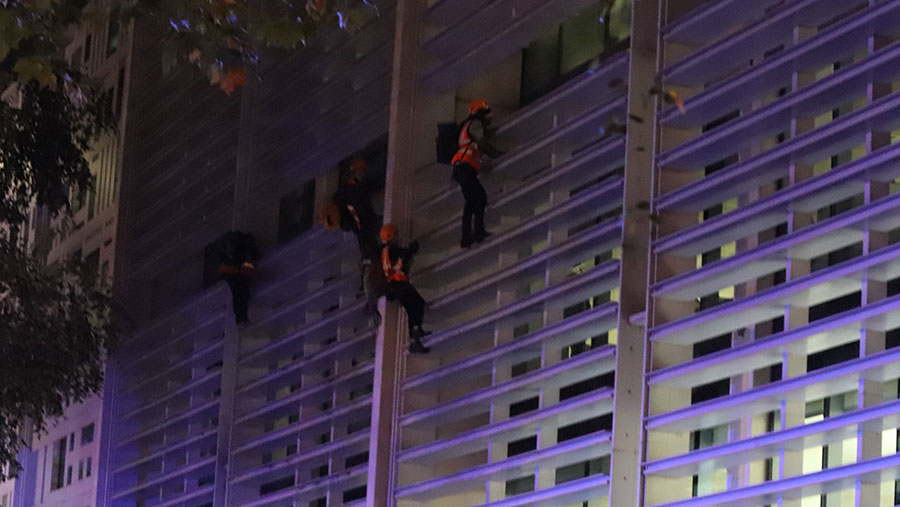Animal Rebellion scale Defra building in anti-meat protest
 © Animal Rebellion
© Animal Rebellion Protesters from animal rights organisation Animal Rebellion have scaled Defra’s second main office in London, to highlight their demands for an end to livestock farming.
Specifically, they are calling for an end to government subsidies for meat and dairy, with the money saved invested in plant-based alternatives “to mitigate climate change and reduce animal suffering”.
See also: How to store, measure and sell on-farm carbon correctly
The action has been mounted in the run-up to the COP26 climate change talks in Glasgow, which get under way on Sunday 31 October.
A banner, unveiled in the early hours of Tuesday 26 October, read “COP26: Invest in a Plant-Based Future”.
Animal Rebellion says its activists intend to remain on the building in Marsham Street “until prime minister Boris Johnson pledges to cut all taxpayer support for animal agriculture, and promises to urge all world leaders to do the same when they attend the COP26 summit later this week”.
According to a statement, the UK government spends at least £1.5bn/year subsidising livestock farming – “10 times the UK’s annual budget for planting trees”.

© Animal Rebellion
‘Hypocrisy’
Animal Rebellion spokesman Nathan McGovern said: “The UK government is simultaneously saying that it is a world leader in climate change while propping up the unsustainable and unprofitable meat and dairy industry, one that emits disproportionate amounts of greenhouse gases.
“This hypocrisy has to end – we need to defund meat and subsidise plant-based alternatives instead.”
Commenting on the action, a government spokesperson insisted the UK would “continue to lead by example to drive global action on tackling climate change and reducing emissions” at COP26.
But while it acknowledges the rights to peaceful protest, the government is also preparing legislation to provide the police and courts with more powers to deal with “public nuisance”, and “stop a selfish minority disrupting the lives of the hardworking majority”.
Criticism
The Animal Rebellion action has also drawn widespread criticism from farming interests.
AHDB head of environment Jonathan Foot explained that the carbon footprint of British beef was 50% lower than the global average and for milk it was 30% lower.
“British cattle diets are predominantly grass, containing very little soya, and their grazing lands absorb and store thousands of tonnes of carbon,” he said.
“UK farmers and growers are not complacent about the risks of climate change.
“They are taking action to show how sustainable their products are versus the global average, and wish to continue to provide British consumers with genuine choices so they can continue to enjoy a sustainable, healthy and balanced diet of nutritious food.”
Social media
The Animal Rebellion action was also criticised on social media.
“I’m going to eat meat, drink milk and eat eggs to protest again this rubbish. We have a choice on what I want to eat. Don’t enforce this on people,” tweeted David Ho (@forthimpact).
“Government is meant to represent the will of the people. The people want to eat meat. This will not work,” added @DaveAllen1976.
BREAKING: Animal Rebellion protestors have scaled DEFRA, demanding government support for a plant-based food system at COP26. The protestors have said that they will take action until the government defunds meat and subsidises a plant-based transition. pic.twitter.com/ycmDSLt12U
— Animal Rebellion (@RebelsAnimal) October 26, 2021
